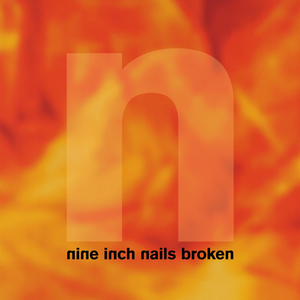Published on Sep 2, 1998
I still remember the first time I ever heard Nine Inch Nails. On
a spring morning in 1992, I was getting ready for another day of
classes in college. I had just been sent
Broken, the then-latest release from Trent Reznor and crew,
for review in the school newspaper. I grabbed the tape, popped it
in the Walkman, and headed out the door towards the academic
building. As I hit the doors to the classroom, this wonderful
electronic noise slammed the earphones into my head… and I was
hooked. I almost kept the tape on during Basic Microeconomics…
and seeing how much I actually learned in that class, I wish I
had.
Recorded at a sensitive period in Reznor’s life (he was fighting
with his then-label TVT – he wouldn’t give them any more material,
and they said he couldn’t record unless they put it out), he banged
off these six tracks without permission from “the record company”,
as he put it in the press release. Whereas his first release
Pretty Hate Machine painted a bleak picture with an
electronic but still pop vein,
Broken dumped in more anger than one could believe, and
removed any vestige of pop music left in his tortured soul.
The worst thing I can say about
Broken is that it’s too damned short. With only six songs
(two of those being instrumentals), you quickly find yourself
wanting Reznor to continue leading you on a guided tour of his own
private hell. Unfortunately, six tracks is all you get – but, oh,
what a wonderful selection of songs!
The guitar feedback loops of “Pinion” quickly lead into “Wish,”
one of the smashes off this album. Reznor again proves that he
knows how to hold a tune, even though his voice seems to be ready
to break under the hate-filled shouting he does throughout the
album. It’s one of the most intense few minutes I’ve ever heard in
the world of rock music, but you can tell from every single note
that this is pain and anger that is not being faked for the sake of
the dollar. Reznor was pissed off and depressed, and he was going
to let anyone who cared know just how he felt.
The intensity continues through the next two vocal tracks,
“Last” and “Happiness In Slavery” (hmm, a subtle slam against “the
record company”, using “slave” long before Prince?), the latter
becoming a hit track. In a sense, it’s surprising to think that
such intense music could become popular in the dance halls and on
the radio – but then again, it’s surprising to think of how many
people felt a kinship to Reznor and what he was singing about.
The remaining tracks – the instrumental “Help Me I Am In Hell”
and the vocal “Gave Up” – aren’t of the same superior caliber as
the rest of the material on
Broken, but they still hold their own quite well, and are
worth checking out.
Broken lives up to its name by breaking away from the pop
core that was still at the center of Nine Inch Nails’s music around
the time of
Pretty Hate Machine. Ironically, their next full-length
release,
The Downward Spiral, would bring Reznor pop success without
him sacrificing his musical values. (I can’t say he’s done the same
in recent years, though.)
Broken still remains one of the most intense albums I’ve
ever listened to, and is a wonderful way to introduce yourself to
the tortured world of Nine Inch Nails.
